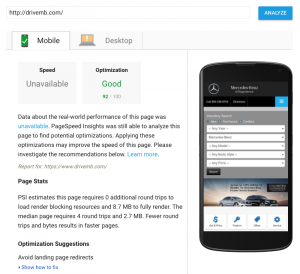- Mar 21, 2012
- 1,090
- 1,447
- Awards
- 10
- First Name
- Ryan
Today Google announced that mobile page speed will become a ranking factor starting in July 2018. Up until now, only desktop page speed was a ranking factor.
So I'm curious, what's your site's mobile page speed and what are you doing to prepare for the impending update?
https://searchengineland.com/google...ll-become-ranking-factor-mobile-search-289904
You can go here to test out your dealer's mobile page speed https://developers.google.com/speed/pagespeed/insights/
Feel free to post your results below. If you want to include your website provider, go for it!
So I'm curious, what's your site's mobile page speed and what are you doing to prepare for the impending update?
https://searchengineland.com/google...ll-become-ranking-factor-mobile-search-289904
You can go here to test out your dealer's mobile page speed https://developers.google.com/speed/pagespeed/insights/
Feel free to post your results below. If you want to include your website provider, go for it!







